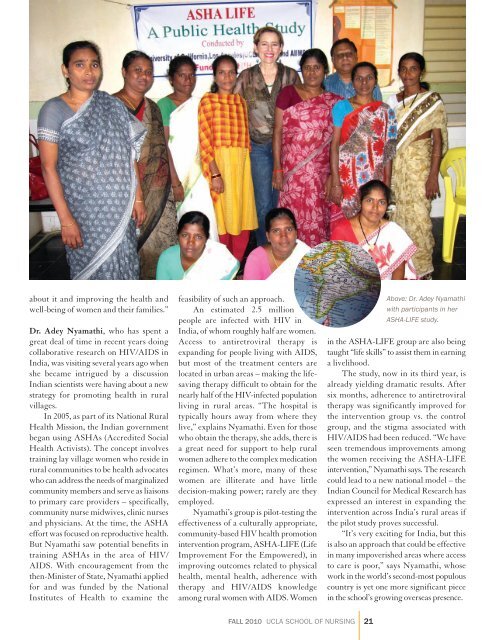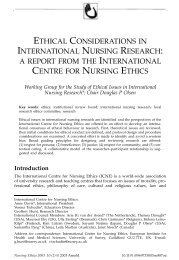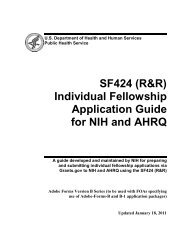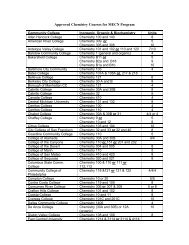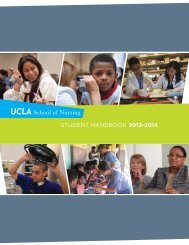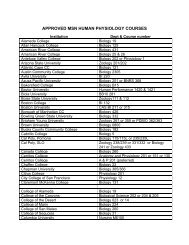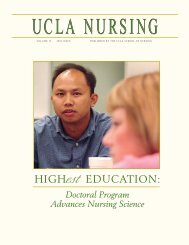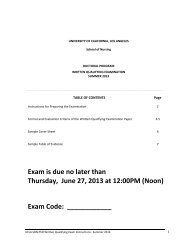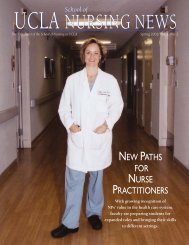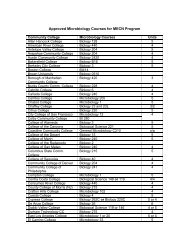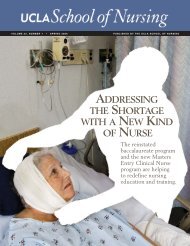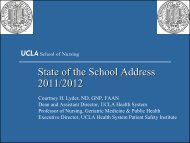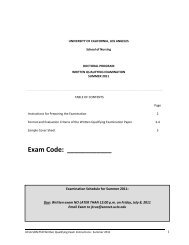proof positive - UCLA School of Nursing
proof positive - UCLA School of Nursing
proof positive - UCLA School of Nursing
Create successful ePaper yourself
Turn your PDF publications into a flip-book with our unique Google optimized e-Paper software.
about it and improving the health and<br />
well-being <strong>of</strong> women and their families.”<br />
Dr. Adey Nyamathi, who has spent a<br />
great deal <strong>of</strong> time in recent years doing<br />
collaborative research on HIV/AIDS in<br />
India, was visiting several years ago when<br />
she became intrigued by a discussion<br />
Indian scientists were having about a new<br />
strategy for promoting health in rural<br />
villages.<br />
In 2005, as part <strong>of</strong> its National Rural<br />
Health Mission, the Indian government<br />
began using ASHAs (Accredited Social<br />
Health Activists). The concept involves<br />
training lay village women who reside in<br />
rural communities to be health advocates<br />
who can address the needs <strong>of</strong> marginalized<br />
community members and serve as liaisons<br />
to primary care providers – specifically,<br />
community nurse midwives, clinic nurses<br />
and physicians. At the time, the ASHA<br />
effort was focused on reproductive health.<br />
But Nyamathi saw potential benefits in<br />
training ASHAs in the area <strong>of</strong> HIV/<br />
AIDS. With encouragement from the<br />
then-Minister <strong>of</strong> State, Nyamathi applied<br />
for and was funded by the National<br />
Institutes <strong>of</strong> Health to examine the<br />
feasibility <strong>of</strong> such an approach.<br />
An estimated 2.5 million<br />
people are infected with HIV in<br />
India, <strong>of</strong> whom roughly half are women.<br />
Access to antiretroviral therapy is<br />
expanding for people living with AIDS,<br />
but most <strong>of</strong> the treatment centers are<br />
located in urban areas – making the lifesaving<br />
therapy difficult to obtain for the<br />
nearly half <strong>of</strong> the HIV-infected population<br />
living in rural areas. “The hospital is<br />
typically hours away from where they<br />
live,” explains Nyamathi. Even for those<br />
who obtain the therapy, she adds, there is<br />
a great need for support to help rural<br />
women adhere to the complex medication<br />
regimen. What’s more, many <strong>of</strong> these<br />
women are illiterate and have little<br />
decision-making power; rarely are they<br />
employed.<br />
Nyamathi’s group is pilot-testing the<br />
effectiveness <strong>of</strong> a culturally appropriate,<br />
community-based HIV health promotion<br />
intervention program, ASHA-LIFE (Life<br />
Improvement For the Empowered), in<br />
improving outcomes related to physical<br />
health, mental health, adherence with<br />
therapy and HIV/AIDS knowledge<br />
among rural women with AIDS. Women<br />
Above: Dr. Adey Nyamathi<br />
with participants in her<br />
ASHA-LIFE study.<br />
in the ASHA-LIFE group are also being<br />
taught “life skills” to assist them in earning<br />
a livelihood.<br />
The study, now in its third year, is<br />
already yielding dramatic results. After<br />
six months, adherence to antiretroviral<br />
therapy was significantly improved for<br />
the intervention group vs. the control<br />
group, and the stigma associated with<br />
HIV/AIDS had been reduced. “We have<br />
seen tremendous improvements among<br />
the women receiving the ASHA-LIFE<br />
intervention,” Nyamathi says. The research<br />
could lead to a new national model – the<br />
Indian Council for Medical Research has<br />
expressed an interest in expanding the<br />
intervention across India’s rural areas if<br />
the pilot study proves successful.<br />
“It’s very exciting for India, but this<br />
is also an approach that could be effective<br />
in many impoverished areas where access<br />
to care is poor,” says Nyamathi, whose<br />
work in the world’s second-most populous<br />
country is yet one more significant piece<br />
in the school’s growing overseas presence.<br />
fall 2010 <strong>UCLA</strong> SCHOOL OF NURSING 21


